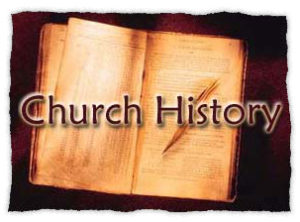
Click here for the entire series and the outline.
Click here for next sermon.
I. The purpose of this study.
- The purpose of this study is to show an unbroken lineage of true churches from the church which Jesus Christ built until today.
- “The history of Baptists, he discovered, was written in blood. They were the hated people of the Dark Ages. Their preachers and people were put into prison and untold numbers were put to death. The world has never seen anything to compare with the suffering, the persecutions, heaped upon Baptists by the Catholic Hierarchy during the Dark Ages.” (J.M. Carroll, The Trail of Blood, page 2)
- “The genuine spirit of religion has been and will be preserved by those only, who dissent from all establishments devised by human policy.” (G.H. Orchard, A Concise History of Foreign Baptists, page 52)
II. The promise by God to preserve His church
- Jesus built His church and promised it would never be destroyed (Mat 16:18).
- The church is the kingdom of heaven/God which was prophesied by Daniel (Dan 2:44).
- The kingdom of God would be set up in the days of the fourth kingdom and would never be destroyed (Dan 2:44 c/w Dan 2:40). The four kingdoms were:
- Babylon – the head of gold (Dan 2:32,38).
- Medes and Persians – the breast and arms of silver (Dan 2:32,39).
iii. Greece – the belly and thighs of brass (Dan 2:32,39).
- Rome – the legs of iron and feet of iron and clay (Dan 2:33,40).
- In the days of the Roman empire (Luk 3:1-3), John the Baptist and Jesus came preaching that the kingdom of heaven/God was at hand (Mar 1:15; Mat 3:2; Mat 4:17).
- The church is that kingdom of God that is entered by baptism (Mat 21:31-32 c/w Luk 7:29-30 c/w Luk 16:16; Act 2:41).
- The church is that kingdom where we eat and drink at Christ’s table (Luk 22:29-30).
- The church is the kingdom of the God of heaven which shall never be destroyed (Dan 2:44).
- The church that Jesus built was that kingdom of heaven of which the gates of hell shall not prevail against it (Mat 16:18-19).
- The church is that kingdom which cannot be moved (Heb 12:28).
- The church will last throughout all ages, world without end, to give glory to God (Eph 3:21).
- Jesus will be with the church always until the end of the world (Mat 28:20).
- Therefore, there has always been an unbroken lineage of true churches throughout history from the church that Jesus built until today.
- Our job is to find one of those churches and become part of it.
III. The perpetuity of the ministry is inseparably connected to the perpetuity of the church.
- God instructs his ordained ministers to ordain elders (Tit 1:5).
- Those ministers are to find faithful men to whom God has given the ability to teach, and commit the preaching of the gospel to them (2Ti 2:2).
- Commit – To give to some one to take care of, keep, or deal with; to give in charge or trust, entrust, consign to (a person, his care, judgement, etc.).
- The duty of preaching the gospel is committed from a pastor to another able man.
- The gospel was committed to Paul (1Ti 1:11).
- Paul then committed it to Timothy (1Ti 6:20)
iii. Timothy was to then commit it to other faithful men (2Ti 2:2).
- Those ordained/appointed ministers are to ordain/appoint able men (Tit 1:5).
- Ordain – II. To appoint, decree, destine, order. 10. To appoint (a person, etc.) to a charge, duty, or office.
- Appoint – II. To determine authoritatively, prescribe, decree, ordain. trans. To determine authoritatively, prescribe, fix (a time, later a place) for any act.
- Ordaining and appointing are the same thing (Tit 1:5; 1Ti 2:7 c/w 2Ti 1:11).
- The office of the pastor/elder/bishop is conferred by ordination/appointment by one ordained minister to another faithful man.
- Jesus was appointed by God (Heb 3:2).
- Jesus then ordained Paul (1Ti 2:7).
iii. Paul then ordained Timothy (1Ti 4:14 c/w 2Ti 1:6) and Titus (Tit 1:5).
- Timothy and Titus were then to ordain others (Tit 1:5; 2Ti 2:2) who would be able to do likewise (2Ti 2:2).
- It is ministers, not seminaries or Bible colleges, to whom God has given this charge and responsibility.
- God’s ministers are commanded to preach the gospel and baptize those who believe it (Mat 28:19-20).
- Preachers/pastors/elders are to do the work of an evangelist (2Ti 4:5).
- Evangelists baptize (Act 21:8 c/w Act 8:36-38).
- Pastors therefore baptize.
- Baptism is the means by which members are added to the church (Act 2:38,41-42,47).
- A preacher baptizing a group of people in a new area is how churches are built (Act 8:5 c/w Act 8:12 c/w Act 9:31).
- Therefore, without a pastor, there can be no addition of members to an existing church, nor can there be any new churches built.
- Therefore, for there to be an unbroken lineage of churches reaching back to the church of Jerusalem, there must likewise be an unbroken lineage of pastors reaching back to Jesus Christ.
